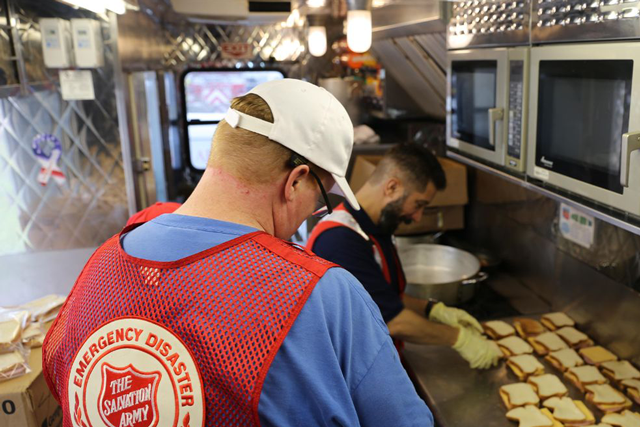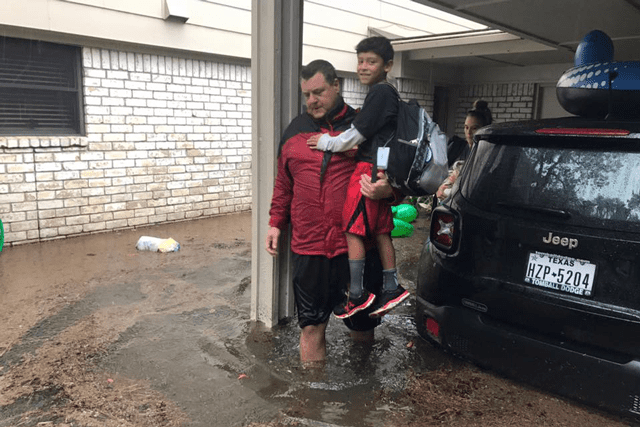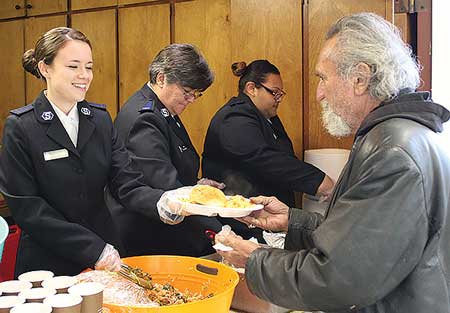New strategic initiatives will work to boost communication, streamline business processes and bolster accountability.
By Christin Thieme –

Territorial Commander Commissioner Kenneth G. Hodder has a vision for the Western Territory, one that comes down to a single word: teamwork.
Several team initiatives launch this fall, each working toward a strategic realignment of the territory to ensure effective stewardship of resources. The goal, Hodder said, is to promote accountability, maximize engagement with people and become a culture that is out in the community—all in an effort to develop ministry.
“There is no question that The Salvation Army is best when it is in close contact with the people who support it and the people it serves,” Hodder said. “If The Salvation Army was born on the street, a place of maximum engagement at that time in history, then we have to be more intentional about it now.”
And that intentionality will start in the meetings of advisory groups, task forces and ad hoc committees of diverse membership and expertise targeting long-term sustainability of Salvation Army ministry in the West. Study topics range from organizational systems, to the role of Territorial Headquarters, fundraising return on investment, major property assets, and enterprise risk management.
The effort largely stems from Project 180, a three-year, three-prong effort to reduce costs, increase income and develop ministry across the West. And it begins at the top, Hodder said, noting that Territorial Headquarters and all commands have revised their budgets moving into the 2018 fiscal year.
“The bottom line is that as we streamline and become more efficient, we are looking for ways to expand to meet the needs of our communities,” said Lt. Colonel Lee Lescano, Territorial Program Secretary. “We are not withdrawing, but simply retooling to become more effective and to meet the ultimate goal of expanding our mission and services.”
Lescano said there is a strong impetus to look closely at what the territory is doing and how it can be done better, including evaluating current services and developing indicators of effectiveness. In addition to data provided by The Salvation Army Human Needs Index, a national guide to illuminating poverty trends, Lescano said the territory also intends to project emerging needs and is in discussions with a local university to partner in doing so.
As divisions and corps similarly look to increase efficiency, Hodder urges officers and staff across the territory to be more engaging with corporations, foundations, and other donors, and has himself met with significant current and future donors. He encourages that face time to happen at every level.
“It is not enough to reduce expenses and increase income doing the same things we have always done; we have to think disruptively,” Hodder said. “We want to redouble our efforts to engage with people who share our vision and mission. The way we engage the community in our mission is the most significant determinant for long-term success or failure.”
To this end, the Community Relations and Development Department has instituted changes to the way it operates, revamping the territorial major gifts and planned giving programs; facilitating interdivisional teamwork, especially in terms of digital platforms and corporate giving; and implementing clearer standards and ways of tracking progress for giving professionals across the disciplines.
“We want to shake the status quo in smart ways, and rethink how we do development in a way that will get us further faster,” said Chaz Watson, Territorial Executive Director of Development. “Ninety-nine percent of the time I introduce someone to The Salvation Army, they say, ‘I didn’t know you did that.’ We’re going for more of those reactions from more people who could make a difference in a breakthrough way for us in terms of influence and giving.”
A summit this month for development professionals and divisional leadership will focus on how to jointly approach and engage prospective philanthropic leaders about The Salvation Army. Training for corps officers on this kind of donor engagement will then be rolled out to the field.
The initiative also expands the participation of people across various sectors of the community. Two groups—the Retired Leaders Advisory Council and Territorial Commander’s Advisory Council—will regularly meet directly with Hodder to lend their own experience and insight. Hodder will also hold a Territorial Commander’s Forum in late September as a live opportunity for officers to ask any question of him.
“There has to be conversation, advice and direct lines of communication,” Hodder said. “Everybody should contribute to or know what’s happening.”
This territorial initiative complements the international Accountability Movement, launched by General André Cox in 2015. As Hodder wrote in the January–February 2017 edition of The Officer, accountability is about people, then about rules; makes no distinction between the big and small things; and is about perception. Its elements come down to self-awareness, self-discipline, self-motivation and responsiveness.
“When a leader establishes a reputation for accountability, the pillars themselves provide a framework for building the Church,” he wrote. “Always careful to keep Christ as the chief cornerstone (Eph. 2:19–22), the accountable leader becomes a living example of Christian principles, bringing personal holiness into the realm of possibility.”
And so, this fall marks a renewed focus on an accountable team set on developing ministry in the West.
As Hodder said, “Sometimes it is helpful to turn things upside down a little bit and see what’s there and what we can do in another way to make more friends, which will enable us to have a greater impact.”















This is a brilliant initiative. I pray that everyone will commit to being intentional in their efforts to steward and build God’s Kingdom.
This is a brilliant initiative. I pray that everyone will commit to being intentional in their efforts to steward and build God’s Kingdom.